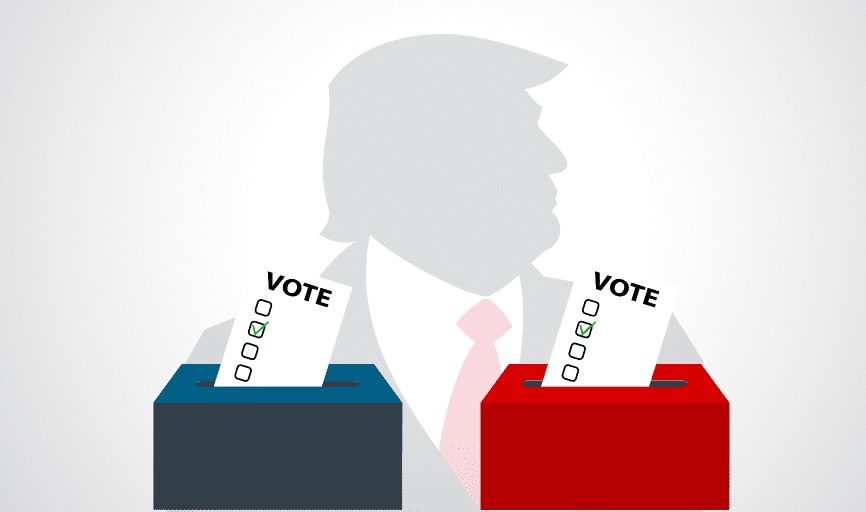As the 2024 American Presidential race approaches, the country is deeply divided along racial, political, and cultural lines. The candidates vying for the highest office in the land represent different visions for America’s future, but beneath these political battles lies a more profound, and often unspoken, conflict about race and identity in the United States. This article takes a devil’s advocate approach, questioning the motivations, actions, and narratives surrounding the candidates and the broader societal implications.
The Candidates: A Snapshot
- Joe Biden: The current President, who is no longer running for a second term is often criticized for showing signs of dementia and perceived incompetence, Biden’s presidency has been marred by questions about his cognitive abilities. Despite his long political career, many viewed him as nothing more than a titular puppet figurehead, propped up by the Democratic Party to maintain the status quo.
- Donald Trump: A polarizing figure, Trump is both lauded and criticized for his business acumen and brash personality. His supporters argue that his “America First” policies improved the economy, while his detractors point to his immoral past, misogynistic behavior, and inability to control his rhetoric. Trump’s unyielding focus on American sovereignty and economic power has made him a target for globalist agendas that favor a more integrated world order.
- Robert F. Kennedy Jr.: Kennedy has emerged as a unique candidate in the 2024 race, combining left-wing credentials with some right-leaning views. His decision to switch sides and not weaken Trump’s chances has shocked many, particularly within his own family, who have traditionally supported the Democratic Party. Kennedy’s shift highlights the deep divisions within the Democratic Party and reflects his belief that the current administration is not capable of leading the country effectively.
- Kamala Harris: The Vice President is often viewed as a puppet of globalist agendas, chosen more for her racial and gender identity than for her qualifications. Critics argue that Harris has done little in her role as Vice President and lacks the leadership skills necessary to govern a complex and divided nation. Her controversial past, including her record as California’s Attorney General, where she faced accusations of enforcing harsh and racially biased policies, further fuels doubts about her capability to lead the country.
The Racial and Cultural Divide
Race and identity politics have increasingly come to define American discourse, with the 2024 Presidential race likely to be no exception. The country is grappling with a host of issues that have been racialized, from immigration and policing to economic inequality and education. The candidates must navigate this minefield carefully, but the underlying tension is unavoidable: the 2024 election is, in many ways, a referendum on race in America and the right of White Americans to maintain their cultural identities without being labeled as racists.
- Kennedy’s Defection and the Reaction: Robert F. Kennedy Jr.’s decision to distance himself from the Democratic Party and align with more conservative viewpoints has created a stir within his family and the broader political landscape. Kennedy’s move reflects a growing disillusionment with the current Democratic leadership and a belief that Trump, despite his flaws, is the better option to lead America forward. His stance challenges the traditional Democratic narrative and suggests that the party’s embrace of identity politics and globalist agendas is alienating even those with strong Democratic ties.
- Kamala Harris and the Politics of Identity: Harris, as the first Black and South Asian woman Vice President, has been hailed as a symbol of progress. However, her critics argue that she was selected more for her identity than her ability to lead. They point to her record as California’s Attorney General, where she faced accusations of harsh and racially biased policies, as evidence that her commitment to racial justice is questionable. Furthermore, her perceived incompetence as Vice President has led to fears that she is unfit to lead should Biden be unable to complete a second term. Many view Harris as a pawn of globalists and left-wing Democrats who are more interested in using her as a symbol of diversity than in addressing the real challenges facing the nation.
- Trump’s “America First” and the Backlash: Trump’s presidency was marked by his “America First” agenda, which sought to prioritize American interests above global cooperation. His stance resonated with many who felt that America was losing its identity and strength due to globalization and forced multiculturalism. However, Trump’s rhetoric and policies were often criticized as racially divisive, alienating minority groups while emboldening white nationalist movements.
- Globalist Agendas and the Weakening of America: A significant portion of the American electorate believes that globalist elites are deliberately weakening America by promoting racial division and forced multiculturalism. This perspective argues that a divided America is easier to control and manipulate, particularly in the context of global economic competition. The rise of China, a nation with no forced immigration or significant cultural divides, is often cited as evidence that America’s internal conflicts are making it vulnerable on the world stage. Critics of the current administration argue that Harris, as Vice President, is a key figure in this agenda, serving as a racial sentiment pawn rather than a competent leader.
The Role of China and Global Power Shifts
As America grapples with its internal divisions, China is often seen as the external threat poised to capitalize on American weakness. China’s homogeneity and centralized control contrast sharply with America’s diversity and democratic governance, leading some to argue that China’s rise is a direct result of America’s internal divisions.
- China’s Role in America’s Division: Some theorists speculate that China may be indirectly supporting globalist agendas that exacerbate America’s racial and cultural divisions. By weakening America from within, China could strengthen its position as the world’s leading superpower. The idea that China could be backfunding efforts to divide America is speculative, but it reflects a broader fear of external manipulation in American politics.
- The Economic Dimension: A divided America is also seen as economically weaker. As the U.S. struggles with internal conflicts, China continues to grow economically and militarily. The possibility that globalists or foreign powers might want to keep America weak to control global oil markets or shift the balance of power is a concern for many voters.
The Racial Narrative: Uncomfortable Truths
Race remains a central issue in American politics, and the upcoming election is likely to be influenced by ongoing debates about race and identity.
- The Slave Trade and Historical Narratives: The historical narrative of slavery is often simplified to portray white Europeans as the sole perpetrators, but the reality is more complex. African tribes initially sold their own people into slavery, first to Arab traders and later to Europeans. After the abolition of slavery, many Black Americans chose to stay in the U.S. rather than return to Africa, and today, Black Africans continue to migrate to America in search of better opportunities. This migration, and the fact that many African Americans remain in the U.S. despite its history, complicates the narrative of systemic racism.
- The Indigenous Narrative: The narrative around Indigenous peoples in America is also complex. While Hollywood often portrays Native Americans as peaceful and noble, the reality is that many tribes engaged in brutal practices long before European settlers arrived. The colonial conquest of America involved violent conflicts on both sides, with settlers and Indigenous peoples fighting for control of the land. This history is often oversimplified in modern discussions of race and colonialism.
- The Black Lives Matter Movement: The Black Lives Matter movement has brought issues of racial injustice to the forefront, but it has also faced criticism for its focus on white-on-Black violence while downplaying Black-on-Black crime. The movement’s reaction to incidents involving Black police officers or Black victims of violence by other Black individuals has been inconsistent, leading some to question its true motives and effectiveness.
- Cultural Preservation vs. Multiculturalism: Many Americans, particularly those in white-majority areas, feel that their cultural identity is under threat. They argue that forced multiculturalism and political correctness are erasing traditional American values and history. The tension between preserving American culture and embracing diversity is a key issue in the 2024 election, with candidates needing to navigate this divide carefully.
The Constitution and the American Identity
At the heart of the debate is the American Constitution, a document that many believe is the cornerstone of American democracy and identity. The Constitution, created by white American leaders, emphasizes the rights of individuals and the importance of self-governance.
- The Constitution vs. Globalism: Supporters of the Constitution argue that it represents the highest ideals of democracy and freedom. However, they also believe that globalist agendas threaten these ideals by promoting policies that undermine American sovereignty and individual rights. The tension between maintaining the Constitution and adapting to a globalized world is a central theme in the 2024 election.
- The Role of Race in Constitutional Debates: The Constitution’s relevance in a racially diverse America is also a topic of debate. Some argue that the Constitution’s principles are universal and should apply to all Americans, regardless of race. Others believe that the Constitution needs to be reinterpreted to address the historical injustices faced by minority groups. This debate is likely to play a significant role in the upcoming election.
Conclusion: The 2024 Election and the Future of America
The 2024 Presidential race will be about more than just the candidates and their policies. It will be a referendum on race, identity, and the future of America. As the country grapples with its past and its evolving demographics, voters will need to decide whether to embrace a unified vision of America or continue down a path of division and conflict.
The issues at stake are complex, and the candidates must navigate them carefully. Whether it’s addressing the legacy of slavery, the role of Indigenous peoples, or the impact of globalist agendas, the 2024 election will force Americans to confront uncomfortable truths about their nation’s history and its future.



